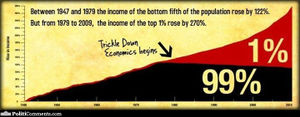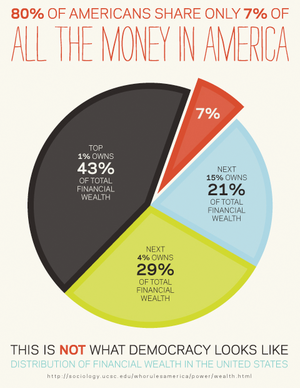Difference between revisions of "The one percent"
(need to find the breakdown of income percentiles vs. percent owned) |
|||
| (13 intermediate revisions by the same user not shown) | |||
| Line 5: | Line 5: | ||
==About== | ==About== | ||
[[File:F a872ed572f.jpg|right|300px]] | [[File:F a872ed572f.jpg|right|300px]] | ||
| − | [[The | + | [[The one percent]] refers specifically to the top 1% of earners in any given [[economy]] -- most commonly the {{USA}}, but it can also refer to other countries or even the global economy. More generally, it refers to the fact that a very small segment of society owns a disproportionately large percentage of society's wealth, a disproportionality which intensifies as you look at smaller and smaller pieces of the top percentiles. |
This disproportionality is an effect of [[economic disparity]], which has been increasing continuously since the late 1970s when employee wages stopped reflecting continued productivity gains. | This disproportionality is an effect of [[economic disparity]], which has been increasing continuously since the late 1970s when employee wages stopped reflecting continued productivity gains. | ||
| − | {{ | + | {{seedling}} |
| + | ===Statistics=== | ||
| + | [[File:Allthemoneyinamerica.png|thumb|distribution of wealth in America]] | ||
| + | * The wealthiest 1% own about 40% of the nation's financial wealth. [http://thinkprogress.org/economy/2011/10/03/334156/top-five-wealthiest-one-percent/] | ||
| + | * The highest-paid 1% of Americans take home 24% of the national income total. [http://thinkprogress.org/economy/2011/10/03/334156/top-five-wealthiest-one-percent/] | ||
| + | * In 2011, the average CEO made 380 times as much as the average worker. [http://money.cnn.com/2012/04/19/news/economy/ceo-pay/] | ||
| + | ** In other words: the average employee needed to work more than a month to make what the CEO makes in an hour. | ||
| + | ** In 2009, the average CEO only made 189 times as much as the average worker. [http://www.motherjones.com/politics/2011/02/income-inequality-in-america-chart-graph] | ||
| + | * (2012 Super-PACs) The top 1% of donors (about 94 donors) give 54% of the money. [http://www.opensecrets.org/outsidespending/donor_stats.php] | ||
| + | * The [[gross domestic product]] of the poorest 48 nations is less than the wealth of the world's richest 3 people. ''(from image-meme; source needed)'' | ||
| + | * In 2009, the Forbes 400 -- the wealthiest 0.0000035% of Americans -- had more wealth than the bottom 50% combined. [http://www.politifact.com/wisconsin/statements/2011/mar/10/michael-moore/michael-moore-says-400-americans-have-more-wealth-/ PolitiFact] | ||
| + | ** In 2010, they had more wealth than the bottom 60% combined -- 400 individuals had more wealth than that possessed by 100 million households. | ||
| + | * The [[Wal-Mart]] heirs alone have more wealth than the bottom 40% combined. [http://www.politifact.com/truth-o-meter/statements/2012/jul/31/bernie-s/sanders-says-walmart-heirs-own-more-wealth-bottom-/ PolitiFact] | ||
| + | * The economic top one percent of the population now owns over 70% of all financial assets, an all time record. [http://www.alternet.org/story/145705/the_richest_1_have_captured_america%27s_wealth_--_what%27s_it_going_to_take_to_get_it_back AlterNet] | ||
| + | ===Popular Perception=== | ||
| + | Most Americans falsely believe that income distribution is far more equitable than it [[income disparity/US|actually is]], while agreeing that it should be still more equitable than they believe it to be. [http://danariely.com/2010/09/30/wealth-inequality/] | ||
| + | |||
| + | ==Related== | ||
| + | * [[economic disparity]] | ||
| + | ==Links== | ||
| + | ===Reference=== | ||
| + | * {{wikipedia}} (redirects to "We are the 99%") | ||
| + | ** related: [[wikipedia:Distribution of wealth|Distribution of wealth]] | ||
| + | {{links/smw}} | ||
| + | ===to file=== | ||
| + | * '''2013-09-10''' [[URL/to file::http://www.dailymail.co.uk/news/article-2416853/Top-1percent-took-record-19-3percent-US-income-year--LARGEST-share-pre-tax-income-1927.html|Top one percent took record 19.3 percent of US income last year - the LARGEST share of pre-tax income since 1927]] | ||
| + | * '''2013-06-24''' | ||
| + | ** [[URL/to file::http://sunlightfoundation.com/blog/2013/06/24/1pct_of_the_1pct/|The Political 1% of the 1% in 2012]] | ||
| + | ** [[URL/to file::http://www.motherjones.com/mojo/2013/06/one-percent-wealthy-dominate-2012-elections-congress|6 Mind-Blowing Stats on How 1 Percent of the 1 Percent Now Dominate Our Elections]] | ||
| + | * '''2013-06-10''' [[URL/to file::http://www.youtube.com/watch?v=Pxs78RFqnyA|Taxing the top 1%]] by [[CJ Guest]] (video) | ||
| + | * '''2010-02-16''' [[URL/to file::http://www.alternet.org/story/145705/the_richest_1_have_captured_america%27s_wealth_--_what%27s_it_going_to_take_to_get_it_back|The Richest 1% Have Captured America's Wealth -- What's It Going to Take to Get It Back?]] "In 1970, CEOs made $25 for every $1 the average worker made. Due to [[jobsolescence|technological advancements, production and profit levels exploded]] from 1970 - 2000. With the lion's share of increased profits going to the CEO's, this pay ratio dramatically rose to $90 for CEOs to $1 for the average worker. [..] As ridiculous as that seems, an in-depth study in 2004 on the explosion of CEO pay revealed that, including stock options and other benefits, CEO pay is more accurately $500 to $1." ... "The economic top one percent of the population now owns over 70% of all financial assets, an all time record." | ||
Latest revision as of 19:23, 18 August 2020
About
The one percent refers specifically to the top 1% of earners in any given economy -- most commonly the United States, but it can also refer to other countries or even the global economy. More generally, it refers to the fact that a very small segment of society owns a disproportionately large percentage of society's wealth, a disproportionality which intensifies as you look at smaller and smaller pieces of the top percentiles.
This disproportionality is an effect of economic disparity, which has been increasing continuously since the late 1970s when employee wages stopped reflecting continued productivity gains.
Statistics
- The wealthiest 1% own about 40% of the nation's financial wealth. [1]
- The highest-paid 1% of Americans take home 24% of the national income total. [2]
- In 2011, the average CEO made 380 times as much as the average worker. [3]
- In other words: the average employee needed to work more than a month to make what the CEO makes in an hour.
- In 2009, the average CEO only made 189 times as much as the average worker. [4]
- (2012 Super-PACs) The top 1% of donors (about 94 donors) give 54% of the money. [5]
- The gross domestic product of the poorest 48 nations is less than the wealth of the world's richest 3 people. (from image-meme; source needed)
- In 2009, the Forbes 400 -- the wealthiest 0.0000035% of Americans -- had more wealth than the bottom 50% combined. PolitiFact
- In 2010, they had more wealth than the bottom 60% combined -- 400 individuals had more wealth than that possessed by 100 million households.
- The Wal-Mart heirs alone have more wealth than the bottom 40% combined. PolitiFact
- The economic top one percent of the population now owns over 70% of all financial assets, an all time record. AlterNet
Popular Perception
Most Americans falsely believe that income distribution is far more equitable than it actually is, while agreeing that it should be still more equitable than they believe it to be. [6]
Related
Links
Reference
- Wikipedia (redirects to "We are the 99%")
- related: Distribution of wealth
Related
- 2018/01/22 [L..T] Vast majority of new wealth last year went to top 1% “A new billionaire is created every other day. The three richest Americans have the same amount of wealth as the poorest half of the U.S. population. And 82% of the global wealth generated last year went to just 1% of the world's population.”
- 2014/04/21 [L..T] The government is a protection racket for the 1 percent “The evidence of income inequality just keeps mounting. According to "Working for the Few," a recent briefing paper from Oxfam, "In the US, the wealthiest one percent captured 95 percent of post-financial crisis growth since 2009, while the bottom 90 percent became poorer."”
- 2014/04/12 [L..T] Worse Than You Can Imagine: The Super Rich Are Hiding Vast Sums of Money "Two new studies have revealed the wealthy have even more wealth than anyone probably thought they did. A study by Emmanuel Saez and Gabriel Zucman has shown that income has only been increasing for the top one-thousandth, while another study by Gabriel Zucman shows exactly where that money is going."
- 2014/02/19 [L..T] The Increasingly Unequal States of America
- 2011/10/03 [L..T] How Unequal We Are: The Top 5 Facts You Should Know About The Wealthiest One Percent Of Americans “It may shock you exactly how wealthy this top 1 percent of Americans is. ThinkProgress has assembled five facts about this class of super-rich Americans...”
- 2011/03/01 [L..T] It's the Inequality, Stupid “Eleven charts that explain what’s wrong with America.”
to file
- 2013-09-10 Top one percent took record 19.3 percent of US income last year - the LARGEST share of pre-tax income since 1927
- 2013-06-24
- 2013-06-10 Taxing the top 1- by CJ Guest (video)
- 2010-02-16 The Richest 1% Have Captured America's Wealth -- What's It Going to Take to Get It Back? "In 1970, CEOs made $25 for every $1 the average worker made. Due to technological advancements, production and profit levels exploded from 1970 - 2000. With the lion's share of increased profits going to the CEO's, this pay ratio dramatically rose to $90 for CEOs to $1 for the average worker. [..] As ridiculous as that seems, an in-depth study in 2004 on the explosion of CEO pay revealed that, including stock options and other benefits, CEO pay is more accurately $500 to $1." ... "The economic top one percent of the population now owns over 70% of all financial assets, an all time record."

